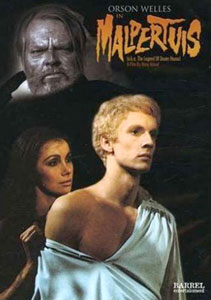 "The director's cut" of Malpertuis (1973) means the Flemish release of the film, which has a number of important scenes which were left out of the edit for North American.
"The director's cut" of Malpertuis (1973) means the Flemish release of the film, which has a number of important scenes which were left out of the edit for North American.
The English language cut, also known as The Legend of Doom House, was first exhibited at Cannes a year earlier, & had been edited by the American distributor who later pretty much admitted the director-overseen edit was far superior, & wished they'd been informed of Harry Kumel's preferences.
There are about twenty more minutes of material in the Flemish edit, some of these scenes among the best in the film, so the English language release really is inferior.
Lost in the Flemish dub, however, is the actual voice of Orson Welles, whose performance was already pretty bad. Loss of that powerful voice makes it even worse.
So even though the so-called "Cannes" version is the lesser version, if a viewer is looking for performances by Welles, it's the Flemish release that seems inferior. Personally I wouldn't encourage anyone to look forward to Welles' performance in either version, & would go with the Flemish edit foremost.
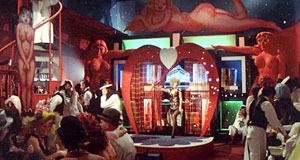 Kumel was something of a wuss & never made his feelings known to the American distributor about his final-edit preferences. Kumel was something of a wuss & never made his feelings known to the American distributor about his final-edit preferences.
So he quietly took advantage of his greater control over the Flemish edit, to get something closer to his intent.
When it was too late, the American distributor rather longingly admitted they'd rather have had the "Cannes version" edited like the Flemish, but they were never given any indication of a better choice.
The director's wussiness extended to his unability to even attempt to control his central star, joined with his eagerness to go boozing with Orson in the middle of the day. Kumel appears to have been a push-over who I imagine caved in at every level of developing the film in ways history does not report, which would account for the film being little more than a very colorful failure.
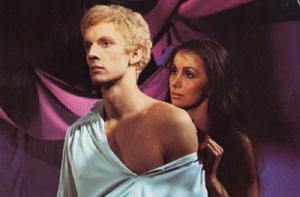 The film's really quite dreadful either way. If you haven't read the novella by Jean Ray, or least an explanatory essay on what's going on in the film, you'll never this side of Hades ever figure out if any of it means anything. The film's really quite dreadful either way. If you haven't read the novella by Jean Ray, or least an explanatory essay on what's going on in the film, you'll never this side of Hades ever figure out if any of it means anything.
If you watch the Flemish version on dvd with the commentary track on, the inexplicability of events is tidily explained throughout, but in the film alone it's never clear.
You have to bring, from outside the film, knowledge that the creepy-cool taxidermist Philaris (Charles Janssens) was hired by Cassavius (Welles) to do something horrible to his captives -- who are the last of the Greek Gods, whom he found long before the story opens.
The gods were fading from the world for lack of believers on a tiny Aegean island. So Cassavius "rescued" them from their marooned state only to have them sewn living into human skins. They thereby forgot their identities & lived as mortals, being further trapped in Cassavius's labyrinthine mansion, Malpertuis.
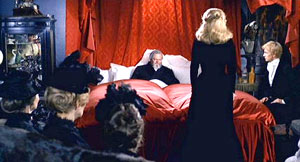 So the secret key to comprehending this gibberishy film is to know all these disgusting people are trapped by a dying old explorer inside his mansion, living as his friends or family or servants. So the secret key to comprehending this gibberishy film is to know all these disgusting people are trapped by a dying old explorer inside his mansion, living as his friends or family or servants.
Cassavius though not one of the gods himself seems to believe he is, & even restricted to a deathbed, lords over his captives like Zeus from Olympus.
Since they have completely forgotten who they really are, they show few if any traits of the divinities they once were. The fat middleaged scrubwoman, for instance, was formerly Aphrodite.
The only one of these "people" who has any recollection of who she once was is Euryale, who was formerly called Gorgon, Goddess of Love & Death. Because the world still believes in love & death she's rather more truthfully immortal than the other gods turned out to be.
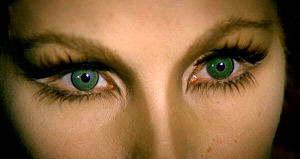 Euryale is played by Susan Hampshire under such heavy make-up design she looks like a department store maniken. But of all the things about this film which fail, the artificiality of Euryale isn't one of them. Euryale is played by Susan Hampshire under such heavy make-up design she looks like a department store maniken. But of all the things about this film which fail, the artificiality of Euryale isn't one of them.
She's rather a splendid figure who fakeness seems appropriate. Hampshire plays multiple roles, each sufficiently altered cosmetically & for hair style & costume as to seem quite distinct, which isn't necessarily due to great acting, but to permitting herself to be used as a well-articulated marionnette.
Even understanding the barely revealed fact that these are the Greek Gods in mortal skins, it'll be impossible to keep track of which God each person of Malpertuis represents.
As supposed specific divinities, they reflect little or none of their origin when you get down to it. Had their remnant personalities more certainly reflected the nature of the Olympians it might've been extraordinary, but nobody seems to have thought of that as a possibility.
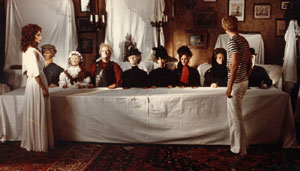 The film has to be appreciated not for any plotline that might be tweeked out of it, but for the striking pictoriality of its baroque set designs, brightly colored cinematography, & expert lighting. The film has to be appreciated not for any plotline that might be tweeked out of it, but for the striking pictoriality of its baroque set designs, brightly colored cinematography, & expert lighting.
Indeed, as to the lighting, on the commentary track the director just can't get over the lighting. He all but admits it was the cinematographer Gerry Fisher who saves the piece from being completely worthless.
Beyond the surface visuals, the acting is always either awful, or so over-the-top artificial as to be worse than awful; & the script makes no sense without interpretive notes close to hand. What was intended rather pompously as an artistic work of fantasy might at best be enjoyed as an especially ornate example of Eurotrash horror, for the last few scenes include some gruesome stuff.
That the success of the piece (rather, lack thereof) hinges on the dying character of Cassavius doesn't help at all. Welles, who insisted on doing his own make-up, looks more like a putty-nosed clown than a character in this film.
He spends the entire performance propped up in his deathbed not performing in concert with other actors, but showing off his own egotistical belief that he & he alone mattered to a scene. He notoriously hated to share.
Supposing he had any acting chops left this close to the end of his life, he could not access his alleged genius any longer, because he was fantastically drunk at all times, & had a director he was able to compltely bamboozle. The producer in particular came to hate Welles, but had been imposed upon to pay a great deal for his participation, in cash, in advance, probably aware that any reasoning producer would otherwise very soon have replaced him for his consistent misbehavior.
Still, much as everyone & especially Kumel would like to blame Welles for many of the film's shortfallings, if you listen between the lines, you'll detect that Welles encouraged Kumel's evident alcoholism.
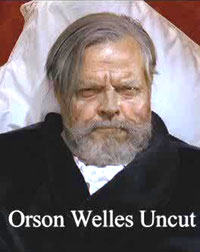 Kumel being overawed by his legendary star did not mix well with directorial snockeredness. And whatever may be laid at Welles' doorstep for ruining this or that, Welles certainly was not responsible for the unholy mess of a script. Kumel being overawed by his legendary star did not mix well with directorial snockeredness. And whatever may be laid at Welles' doorstep for ruining this or that, Welles certainly was not responsible for the unholy mess of a script.
One of the extras on the disc is an interview-based documentary packed with rare outtakes, Orson Welles Uncut (2007), in which the director, producer, & others pretty much avenge themselves on Welles' memory for being a capricious shithead, then seemed dead-set on sabotaging the film thereafter.
But I can't agree the faults of the film are his doing, for it's pretentious & boring before he appears in the tale, & remains so after his character is dead & gone.
The primary value of the film is academic. And viewing it academically, one can find things of interest, notably a type of expressionist lighting that seems to be induplicable today, as all the lighting engineers who could do this are long dead.
The dvd set includes an eleven minute interview with Susan Hampshire called One Actress, Three Parts (2007) which is a veritable homage to to her multiple-role performance, which underscores another academic value to studying the film.
 Hampshire's performance in three distinct & central roles, plus a minor forth role toward the end, would be an unusual achievement for any actor, even if she does manage to come off mainly as a marionette. Regarded as puppet theater with live puppets, Malpertuis is rendered more rather than less interesting. Hampshire's performance in three distinct & central roles, plus a minor forth role toward the end, would be an unusual achievement for any actor, even if she does manage to come off mainly as a marionette. Regarded as puppet theater with live puppets, Malpertuis is rendered more rather than less interesting.
And certainly if or when one knows what the hell is going on in the story, it is one of the more wildly surreal fantasies ever set to film. It's only too bad it's a muddled confusion with most of the important information a secret kept by the director off the screen.
A final academic value is the influence of Jean Cocteau. There are scenes that seem almost slavishly to imitate Cocteau, & the casting of Matthieu Carriere as the kidnapped pretty-boy sailor Jan & Cassavius's intended heir, is right out of Cocteau's homoerotic imagination. (In Jean Ray's novel, Jan is Jean-Jacques, Cassavius's nephew from the mating of the mortal Nicolas with a never named ensnared goddess since faded from Malpertuis. None of that's clear from the very altered film narrative).
If Cocteau couldn't direct a more sensible filmic fantasy than this one, he wouldn't've been worthy of the imitation. Had Cocteau or Bunuel directed Malpertuis on these sets with these actors (sans Welles perhaps), this might've been something grand, though not with this particular script.
Nevertheless, for the sake of the history of film fantasy, it's a belated blessing to have available, as a two-disc set, both versions of the film in very brightly restored transfers. The discs have excellent extras that are better than the film, & commentary track also more interesting than the film.
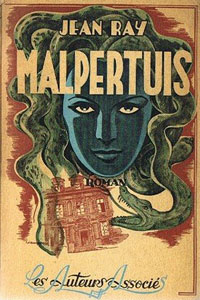 Among the extras there is a three-quarters-hour interview with director Kumel & film journalist Del Valleseven, & an eleven minute documentary on Belgian writer Jean Ray/John Flanders the original author of Malpertuis the novel. Among the extras there is a three-quarters-hour interview with director Kumel & film journalist Del Valleseven, & an eleven minute documentary on Belgian writer Jean Ray/John Flanders the original author of Malpertuis the novel.
This little overview of Jean Ray will certainly encourage the viewer to seek out the book, which is a much fuller epic including the quest to find the hidden island of the gods, much more extraordinary than the film.
Also among the sundry extras on the two-disc dvd, there are two short films directed by Harry Kumel. Aether (1960) is a one-reel symbolist fantasy which due to brevity does not test one's patience & comes off as something of a minor masterpiece. Reliant on photography & having no dialogue, it is about a man who suffers hallucinations after an injury.
The telefilm De Grafbewaker (1965) is loosely based on a story by Franz Kafka. Elegantly filmed in black & white, it's about an aged & probably hallucinating guardian of a royal treasure vault or grafbewaker. A member of the family arrives to inventory the contents of the vault, & is subjected to the old guard's proud achievement of having nightly done battle with spirits of his Lord's ancestors.
copyright © by Paghat the Ratgirl
|
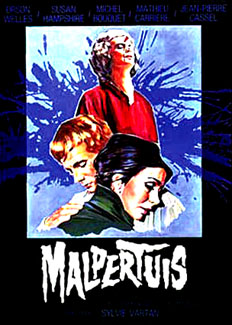

 Kumel was something of a wuss & never made his feelings known to the American distributor about his final-edit preferences.
Kumel was something of a wuss & never made his feelings known to the American distributor about his final-edit preferences. The film's really quite dreadful either way. If you haven't read the novella by Jean Ray, or least an explanatory essay on what's going on in the film, you'll never this side of Hades ever figure out if any of it means anything.
The film's really quite dreadful either way. If you haven't read the novella by Jean Ray, or least an explanatory essay on what's going on in the film, you'll never this side of Hades ever figure out if any of it means anything. So the secret key to comprehending this gibberishy film is to know all these disgusting people are trapped by a dying old explorer inside his mansion, living as his friends or family or servants.
So the secret key to comprehending this gibberishy film is to know all these disgusting people are trapped by a dying old explorer inside his mansion, living as his friends or family or servants. Euryale is played by Susan Hampshire under such heavy make-up design she looks like a department store maniken. But of all the things about this film which fail, the artificiality of Euryale isn't one of them.
Euryale is played by Susan Hampshire under such heavy make-up design she looks like a department store maniken. But of all the things about this film which fail, the artificiality of Euryale isn't one of them. The film has to be appreciated not for any plotline that might be tweeked out of it, but for the striking pictoriality of its baroque set designs, brightly colored cinematography, & expert lighting.
The film has to be appreciated not for any plotline that might be tweeked out of it, but for the striking pictoriality of its baroque set designs, brightly colored cinematography, & expert lighting. Kumel being overawed by his legendary star did not mix well with directorial snockeredness. And whatever may be laid at Welles' doorstep for ruining this or that, Welles certainly was not responsible for the unholy mess of a script.
Kumel being overawed by his legendary star did not mix well with directorial snockeredness. And whatever may be laid at Welles' doorstep for ruining this or that, Welles certainly was not responsible for the unholy mess of a script. Hampshire's performance in three distinct & central roles, plus a minor forth role toward the end, would be an unusual achievement for any actor, even if she does manage to come off mainly as a marionette. Regarded as puppet theater with live puppets, Malpertuis is rendered more rather than less interesting.
Hampshire's performance in three distinct & central roles, plus a minor forth role toward the end, would be an unusual achievement for any actor, even if she does manage to come off mainly as a marionette. Regarded as puppet theater with live puppets, Malpertuis is rendered more rather than less interesting. Among the extras there is a three-quarters-hour interview with director Kumel & film journalist Del Valleseven, & an eleven minute documentary on Belgian writer Jean Ray/John Flanders the original author of Malpertuis the novel.
Among the extras there is a three-quarters-hour interview with director Kumel & film journalist Del Valleseven, & an eleven minute documentary on Belgian writer Jean Ray/John Flanders the original author of Malpertuis the novel.